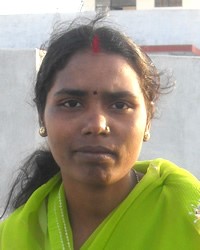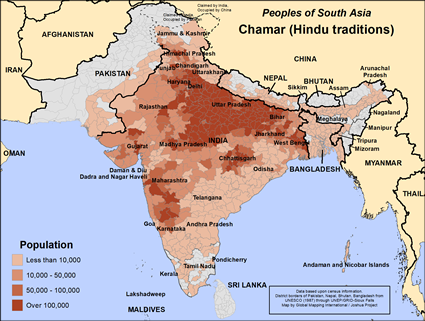Chamar (Hindu traditions) in India

Photo Source:
Anonymous
|

Map Source:
People Group data: Omid. Map geography: UNESCO / GMI. Map Design: Joshua Project.
|
| People Name: | Chamar (Hindu traditions) |
| Country: | India |
| 10/40 Window: | Yes |
| Population: | 46,307,000 |
| World Population: | 46,779,000 |
| Primary Language: | Hindi |
| Primary Religion: | Hinduism |
| Christian Adherents: | 1.24 % |
| Evangelicals: | 0.62 % |
| Scripture: | Complete Bible |
| Ministry Resources: | Yes |
| Jesus Film: | Yes |
| Audio Recordings: | Yes |
| People Cluster: | South Asia Dalit - other |
| Affinity Bloc: | South Asian Peoples |
| Progress Level: |
|
Introduction / History
The Chamar people are also known as Bhambi, Asadaru, Khalpa, Machigar, Mochi, and Rohit. The origins of the name "chamar" come from their leather work.
The Chamar people live primarily in India's states of Uttar Pradesh, Madhya Pradesh and Bihar. Smaller numbers live all over India.
What Are Their Lives Like?
In traditional Hinduism, those who deal with "dead" matter are among the low status communities. This is especially true for those who work with leather, which comes from the "holy" cow. The Chamar's main occupation is manufacturing shoes and chappals from finished leather. Chamars are among the largest of the low class communities in the Hindu world and have very low status. This low status in Indian-Hindu tradition makes them undesirable and unworthy of any sort of consideration or provision by society. This translates into frequent joblessness, lack of education and lifelong poverty. Traditional upper caste members would avoid their shadow, though this would be rare today.
Some are engaged in daily-wage labor and petty business. Chamar Women are also involved in agricultural work, animal husbandry and various economic activities.
The Chamar practice monogamy in marriage. Dowry is largely prevalent and is paid in cash. They allow remarriage for widowers but not for the widows. The dead body of a bachelor is buried lying on its back with the head facing the south, whereas others are cremated, and their mortal remains are immersed in sacred water. They offer rice balls to the dead and to ancestors on the tenth day after death.
What Are Their Beliefs?
The Chamar are Hindu. They belong to the Shiva and Bhagvat sects. Their deities include Bahiroba, Janai, Kandova of Jejori and Bhawani of Tuljapur. They follow the spiritual teachings of Ravidas. Chamars recite mythological tales and sing songs from the religious epics. They celebrate the festivals such as Diwali, Panchami, Ganesh Chaturthi, Kartik, Holi and Hannami.
What Are Their Needs?
There is a slightly higher degree of responsiveness to the gospel among the Chamars than among other low class communities. There is a church planting movement underway among Chamars in several districts across India, but they are far from unreached. It will take many workers to get the gospel to all Chamar communities throughout India.
Prayer Points
Pray for God to send hundreds of Christian workers among them and meet their spiritual and physical needs.
Pray for the Chamar people to break through the caste barrier and be accepted by other communities.
Pray that these Chamar believers will be salt and light to Chamar communities throughout India.
Pray that church planting will multiply across all Chamar communities.